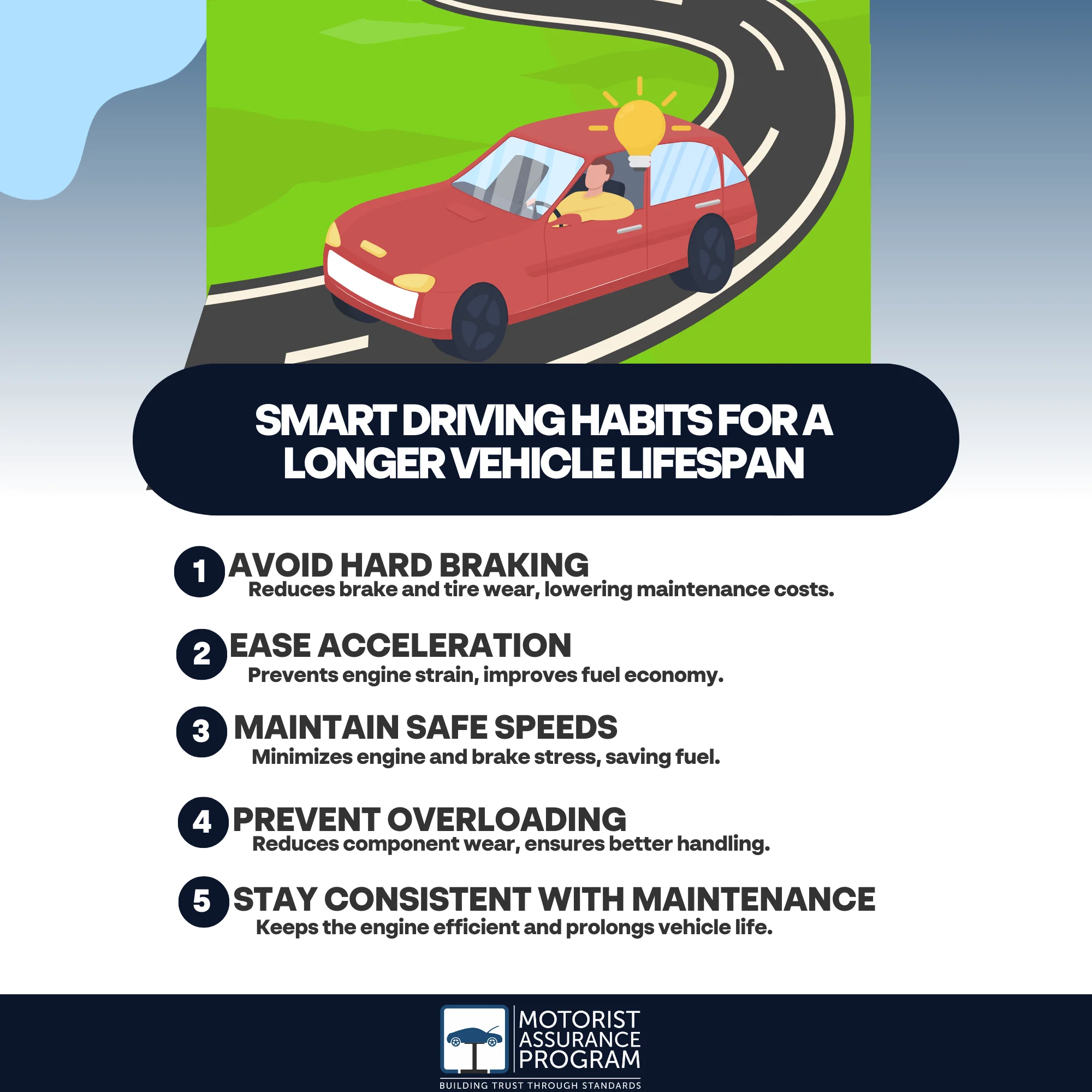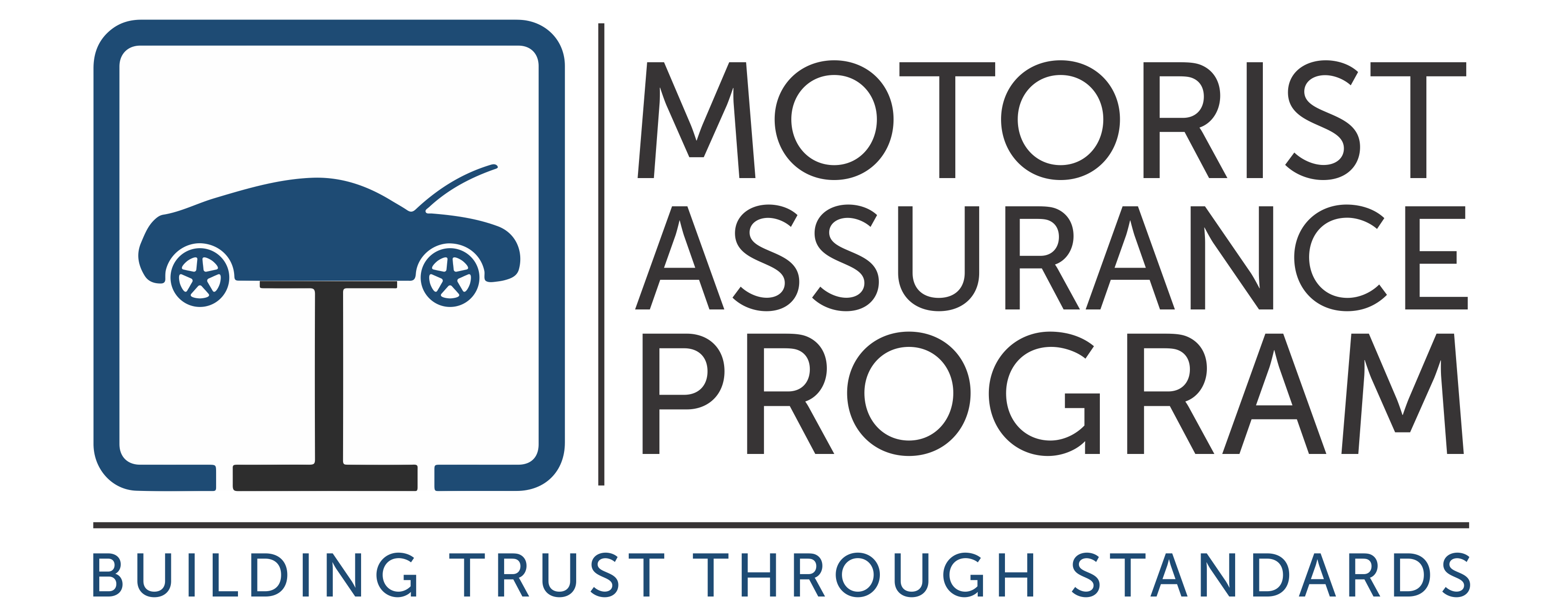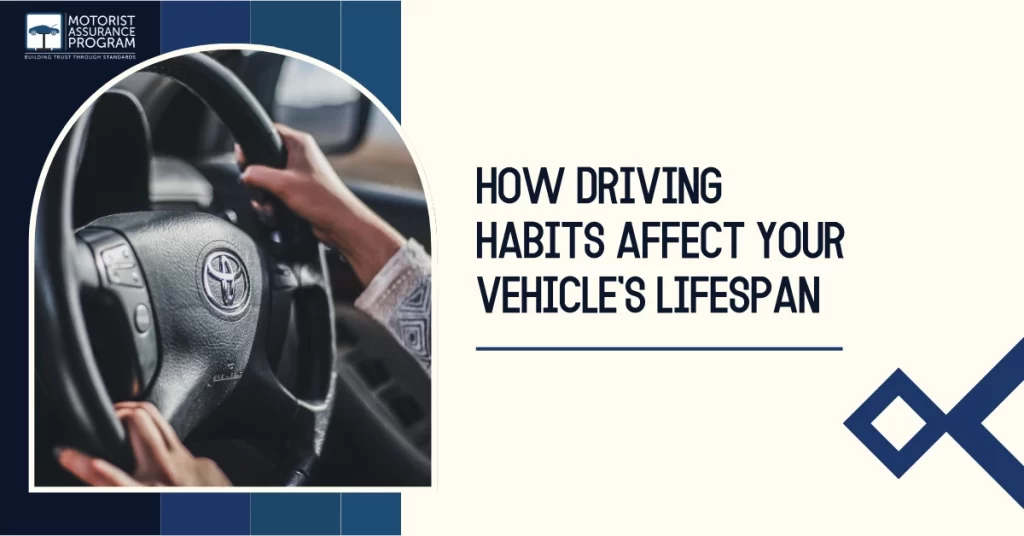Your driving habits greatly impact your vehicle’s lifespan. Frequent hard braking and rapid acceleration strain the engine and brakes, leading to premature wear. Driving at high speeds amplifies fuel consumption and heat, risking engine damage. Overloading your vehicle stresses essential components, which can cause costly repairs. Plus, inconsistent maintenance, like skipping oil changes, results in engine wear and reduced efficiency. All these factors contribute to increased repair costs and decreased reliability. By adopting smoother driving techniques and sticking to maintenance schedules, you can increase your vehicle’s longevity and performance. Explore how simple changes can make a big difference!

Key Takeaways
- Frequent hard braking strains brake components and tires, leading to accelerated wear and increased maintenance costs.
- Rapid acceleration puts unnecessary stress on the engine and drivetrain, shortening the vehicle’s lifespan and increasing fuel consumption.
- Driving at high speeds increases engine strain, amplifies brake wear, and elevates fuel costs, impacting overall vehicle longevity.
- Overloading the vehicle stresses essential components, causing overheating and compromising handling, which can lead to costly repairs.
- Inconsistent maintenance, like skipping oil changes, leads to engine wear and decreased fuel efficiency, ultimately reducing vehicle lifespan and resale value.
Frequent Hard Braking
Frequent hard braking can feel like a necessary response to the chaos of daily driving, but it comes with considerable costs. This bad driving habit not only affects your car’s performance but also shortens its lifespan. Each time you slam on the brakes, you put extra strain on various components, including the brake pads, rotors, and tires. Over time, these parts wear out faster, leading to more frequent repairs and replacements.
Abrupt stops can also impact your vehicle’s suspension system and transmission. When you brake hard, the sudden shift in momentum can cause unnecessary stress on these systems, resulting in potential failures down the line. You might not realize it, but driving habits that damage your car can accumulate quickly, translating to higher maintenance costs and decreased reliability.
To increase your vehicle’s longevity, it is crucial to adopt smoother driving techniques. Anticipating traffic flow and gradually slowing down can significantly reduce the need for hard braking. By making these small adjustments, you’ll not only protect your car but also create a safer driving environment for yourself and others on the road.
Rapid Acceleration
While hard braking can take a toll on your vehicle, rapid acceleration poses its own set of challenges. When you frequently stomp on the gas pedal, you’re not just speeding up; you’re putting unnecessary strain on your engine, transmission, and drivetrain. This kind of bad driving habit can lead to premature wear and tear, ultimately shortening your car’s lifespan.
Rapid acceleration can cause your engine to work harder than it needs to, increasing fuel consumption and emitting more pollutants. It also affects your tires, as sudden bursts of speed can lead to uneven wear. Over time, this can necessitate costly replacements and repairs.
To promote longevity, consider adopting good driving habits. Gradually increasing your speed allows your vehicle to operate more efficiently, leading to better fuel economy and less strain on your components. Smooth driving amplifies your car’s performance and contributes to a safer and more enjoyable experience on the road.
Driving at High Speeds
Driving at high speeds can remarkably influence your vehicle’s longevity and performance. When you push the limits on the road, you’re not just risking a ticket; you’re also accelerating wear and tear on your car. Here are a few reasons to reconsider these driving habits:
- Increased engine strain
- Higher fuel consumption
- Greater brake wear
- Enhanced tire degradation
- Elevated risk of accidents
Exceeding speed limits forces your engine to work harder, leading to overheating and potential mechanical failures. Plus, high speeds can amplify the stress on your brakes, resulting in more frequent replacements. Fuel efficiency takes a hit too, as your vehicle burns more gas at higher speeds, which can considerably increase your operating costs.
To preserve your vehicle’s lifespan, it’s vital to avoid these bad driving habits and adopt a more measured approach. By adhering to speed limits and driving sensibly, you not only protect your investment but also improve your safety on the road. Remember, a well-maintained vehicle is a reliable one, and your driving habits play an important role in achieving that.
Overloading the Vehicle
Pushing your vehicle’s limits doesn’t stop at speed; overloading it can also take a significant toll on its lifespan. When you consistently exceed your vehicle’s weight limit, you’re not just risking a breakdown; you’re also accelerating wear and tear on essential components. Excess weight puts extra strain on the engine, transmission, and suspension system, leading to costly repairs down the line.
Incorporating safe driving habits means recognizing and adhering to your vehicle’s load capacity. You might think it’s just a few extra bags or supplies, but those seemingly minor additions can turn into one of the worst driving habits. Overloading can lead to overheating, reduced fuel efficiency, and even compromised handling – all of which diminish your vehicle’s longevity.
An overloaded vehicle can negatively impact your braking system, increasing stopping distances and heightening the risk of accidents. By respecting your vehicle’s load limits, you not only improve its lifespan but also guarantee a safer driving experience for yourself and others on the road. So next time you’re packing for a trip, remember: less is more when it comes to preserving your vehicle’s health.
Inconsistent Maintenance
Neglecting routine maintenance can drastically shorten your vehicle’s lifespan. Skipping oil changes might seem harmless at first, but over time, it leads to significant engine wear and tear. Your car needs regular care to perform at its best, and neglecting this can result in costly repairs or even premature failure.
- Engine oil lubricates moving parts, reducing friction.
- Dirty oil can cause overheating and sludge buildup.
- Ignoring maintenance schedules can lead to decreased fuel efficiency.
- Regular checks can spot small issues before they become major problems.
- Consistent care raises your vehicle’s resale value.
Developing good driving habits to save fuel is vital , but a driver also needs to develop low-risk driving habits that include timely maintenance. When you commit to regular oil changes and other routine checks, you’re ensuring that your vehicle runs smoothly and efficiently. This not only protects your investment but also contributes to safer driving experiences. Remember, a well-maintained vehicle doesn’t just last longer; it also performs better and consumes fuel more efficiently. Prioritize maintenance to keep your car in top shape and prolong its lifespan.
Frequently Asked Questions
How Does Weather Affect My Driving Habits and Vehicle Lifespan?
Weather can significantly influence your driving habits. Rain, snow, or extreme temperatures often lead you to adjust speed, braking, and acceleration, which can impact your vehicle’s performance and longevity if not managed carefully.
What Role Does Tire Pressure Play in Vehicle Longevity?
Keeping your tires properly inflated guarantees even wear, improves fuel efficiency, and enhances handling. Low pressure can lead to faster deterioration, costing you more in maintenance and replacements down the road.
Can My Driving Habits Impact Fuel Efficiency?
Absolutely, your driving habits considerably impact fuel efficiency. Rapid acceleration, excessive idling, and aggressive braking can waste fuel. By adopting smoother driving techniques, you’ll enhance efficiency, save money, and reduce your vehicle’s environmental footprint.
Are There Specific Driving Techniques to Extend Vehicle Life?
Yes, adopting smooth acceleration and braking, maintaining steady speeds, and avoiding excessive idling can greatly extend your vehicle’s life. Regular maintenance checks and being mindful of road conditions also contribute to better long-term performance.
How Does My Vehicle’s Age Influence the Effects of Driving Habits?
As your vehicle ages, your driving habits amplify wear and tear. So, ease up on the gas, and treat it gently to extend its life.
Conclusion
In conclusion, your driving habits play a crucial role in your vehicle’s lifespan. Frequent hard braking, rapid acceleration, and driving at high speeds can wear down your car faster than you might think. Overloading it and skipping maintenance only compound the problem. So, why not adopt smoother driving techniques and keep up with regular service? By doing so, you can enjoy a more reliable ride and save money in the long run. Your vehicle—and your wallet—will thank you!


